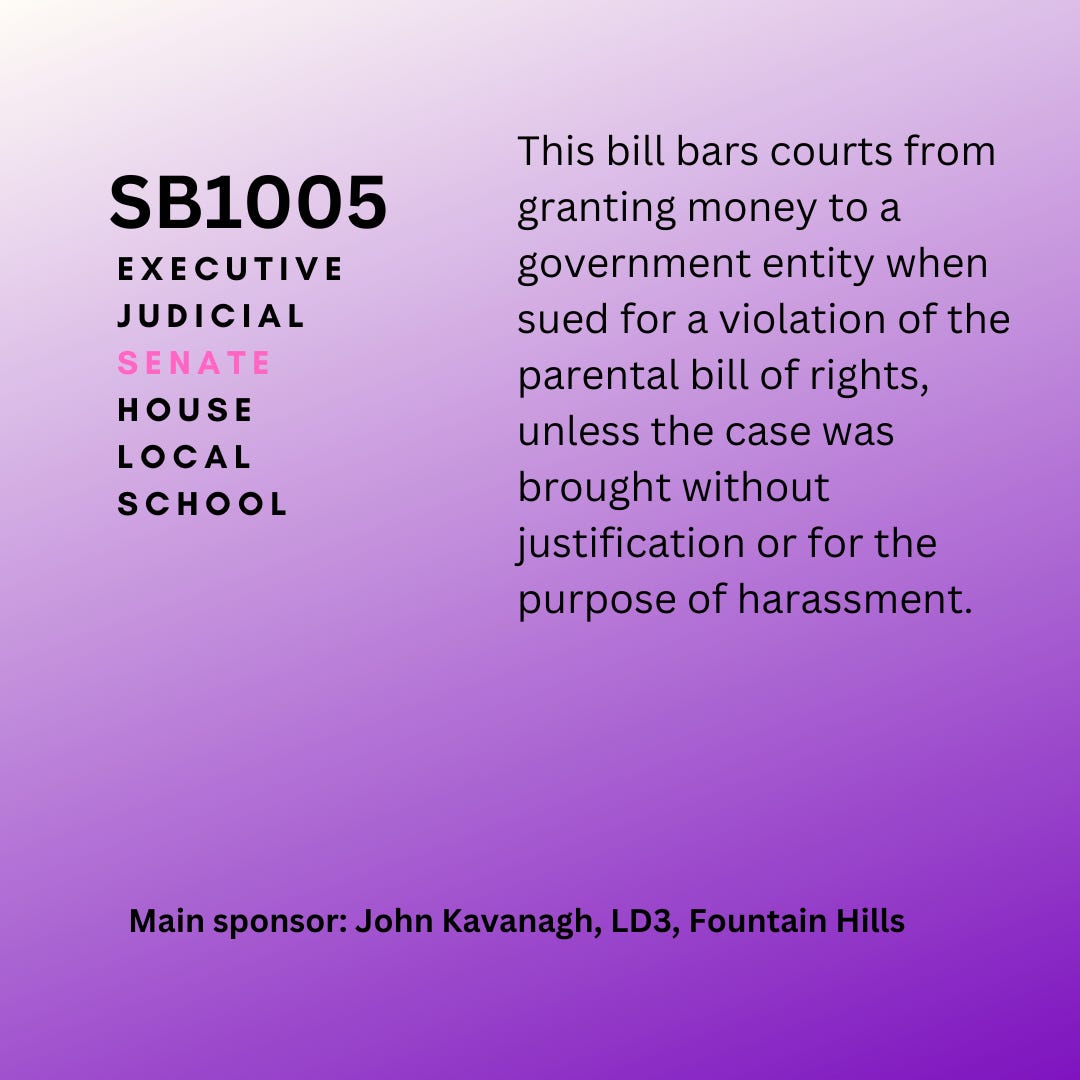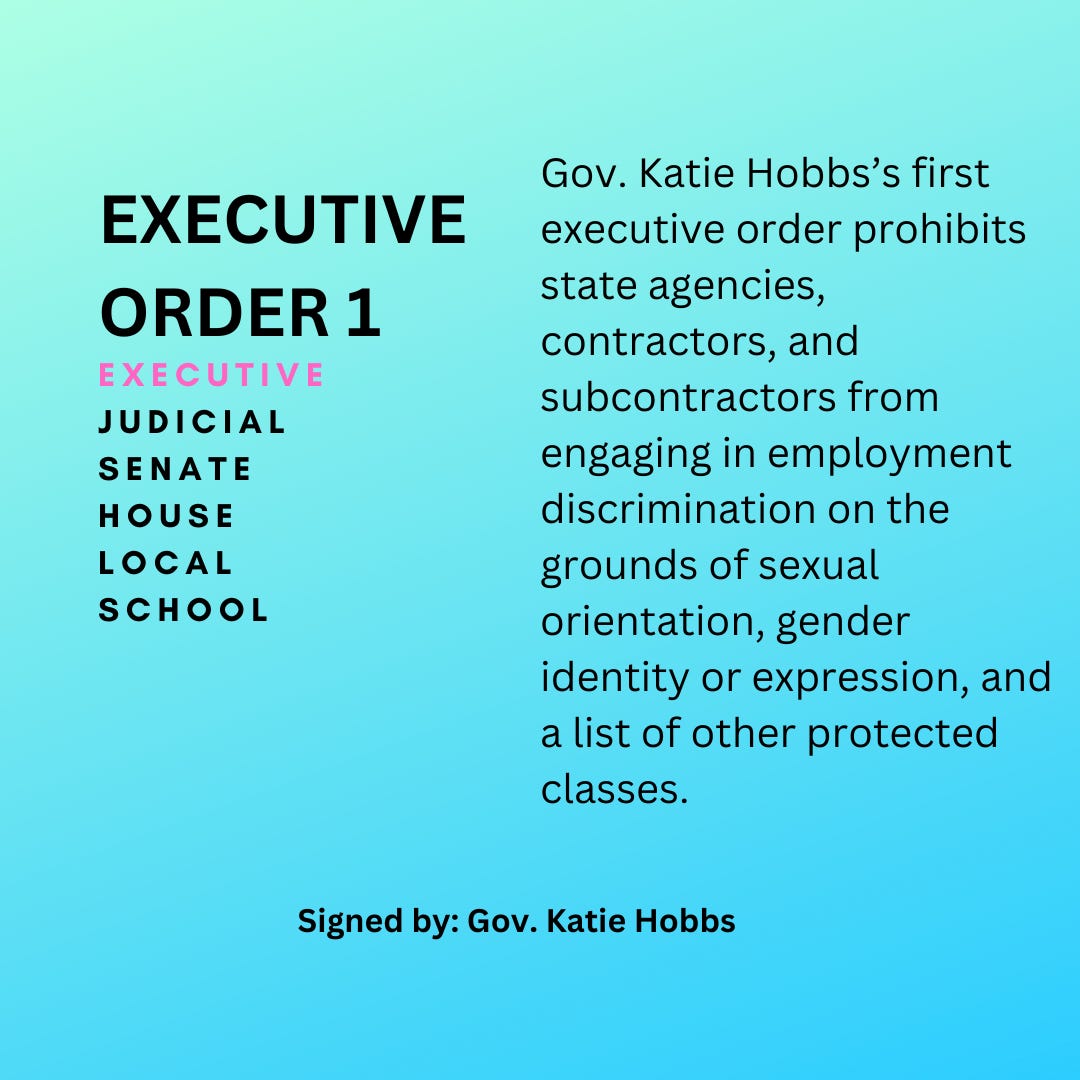Welcome to LOOKOUT
Our first newsletter. Everything you need to know about SB1001, and upcoming events.
We’ve made our first post free to everyone. If you enjoy what you’re reading today, and want to support the only non-profit queer news publication in Phoenix, be sure to subscribe to get this kind of weekly content (and breaking alerts) sent directly to your email.
Religion, on the attack.
A pre-filed bill submitted by one of the state’s conservative lawmakers aims to put the nation’s culture wars at the top of the agenda this year, by limiting teachers’ ability to address students by pronouns that don’t align with the gender they were given at birth if they don’t have parental permission.
The bill, SB1001, also outlines a religious exemption for those who don’t agree with students expressing alternative gender identities.
John Kavanagh, a Republican representing Fountain Hills who has a long history proposing bills to limit trans Arizonans’ rights, introduced it as the very first bill this year, signaling that the Republican party—at least in the state house—is looking to double down on the nation’s over-zealous moral panic over trans youth.
The current bill is a similar mock up to last year’s House Bill 2293, introduced by Rep. John Fillmore of Apache Junction, that shielded parents and school employees from refusing to address children by their preferred pronouns or names. That bill never received a vote in committee and didn’t move forward.
In a phone interview this week, Kavanagh said that the SB1001 is simply about parental power, and respecting religious beliefs.
When pressed on the negative impacts of students being outed to family members, or not having familial support at home, Kavanagh stated that the bill has ancillary benefits, where families could be reported to the state child protective agency, and children could be removed.
(Paid subscribers can read an edited down version of the interview publishing tomorrow, where LOOKOUT dug in with Kavanagh and pushed him to explain more in depth what his goals were with the bill.)
"At the end of the day, I think we just need to be respectful of others' beliefs," he said.
But that respect would appear to go one way with lawmakers who have made a career of using the legislature to reel in civil rights for queer people.
In 2012, Kavanagh tried to advance a bathroom bill that criminalized people for using the restroom of their stated gender identity. The proposed bill threatened trans people with a class 1 misdemeanor and a $2,500 fine for using a restroom that didn’t match their gender assigned at birth.
Later, he tried to protect businesses that enforced bathroom bans from civil lawsuits, if they had a deeply held religious beliefs against trans people.
Mara Kesiling, executive director at the National Center for Transgender Equality, said of the bill that it was “disconnected from the reality facing transgender Arizonans.”
Both bills failed, with the latter taking an about-face and replaced by a bill that banned health professionals from claiming they were experts or board-authorized if they actually weren’t.
But where Kavanagh found pushback nearly a decade ago in promoting anti-trans bills, there is speculation that he might find some footing with the state’s newly entrenched evangelical conservatives. Last year, alone, he found an alliance among other far-right legislators who proposed nine separate bills attacking trans people and, specifically, transgender children.
One included banning gender reassignment surgery for youth under 18 years old— a move he called on Twitter as “genital mutilation” — despite gender reassignment surgery being an incredibly rare procedure, and done after months (or sometimes years) of hormonal and talk therapy. The other bill banned trans girls from being able to play on girls’ sports teams if they were assigned male at birth.
Gov. Doug Ducey signed both bills into law.
Kavanagh is just one legislator in a wave of evangelical lawmakers nationwide who have been using the pulpit to elevate their platform and denounce people who, they say, don’t conform to certain Christian sect’s teachings on gender roles.
He said, in regards to SB1001, that he didn't think the bill should make any person feel like they are "bad." But the religious right's rhetoric around trans issues, pronouns, and parental choice all echo a homophobic trope that has—at least until recently—been beyond the pale, as seeing as LGBTQ+ people as a "danger."
Among religious groups that Kavanagh has gone out of his way to support, almost half of evangelical voters across the nation believe that society has become “too accepting” of trans people, according to a 2022 Pew Study. That study showed that white evangelicals — by 68% — believe that Americans have gone too far in addressing and accepting trans people.
But even if Kavanagh does get some support, it’s likely newly elected Gov. Katie Hobbs — who denounced both the bans on gender-affirming surgeries and girls’ sports — would veto those bills if they ever got to her desk.
FINAL OUTLOOK
“Violent attacks on people in the LGBTQ community are on the rise, and the cause of this lies solely at the feet of elected officials—at every level—who promote these ideologies."
-Jeanne Casteen, Exec. Director, Secular AZ
EYES ON THE STATE
LOOKOUT's 'Eyes on the State' is brought to you by an exclusive partnership with Equality AZ. Check here every week to see what's being proposed by lawmakers, who are the state power brokers, and context for current and upcoming bills.
Three things to know about it:
1- A bill like this has two basic functions. The first is that it makes public schools less hospitable to students of marginalized genders. The second is that it advances the legal usage of “biological sex,” which until recently did not exist in law. In Arizona, the term only entered state statute in 2022, with SB 1138 and SB 1165.
2- A similar bill was run in 2022, HB 2293. It went nowhere.
3- Kavanagh wants to extend the bill with a similar ban on chosen names.
Three things to know about it:
1- The parents’ bill of rights is used as a cornerstone of many anti-LGBTQ+ policies, and the intent of a bill like this is to increase the financial burden of defending against perceived instances of the government “interfering with or usurping” parental rights.
2- The downstream effect is that government agencies and employees may avoid perfectly legal ways of supporting the LGBTQ+ community out of fear that it may expose them to legal action.
3- Attempts to extend the parents’ bill of rights have found support and success over the years, but not uniformly so. With the new governor, it’s become less likely that this kind of bill can succeed.
Three things to know about it:
1- With the 2020 Supreme Court decision in Bostock v Clayton County, LGBTQ+ workers are already protected from employment discrimination under Title VII of the Civil Rights Act. This executive order directs state agencies to make specific hiring policies to ensure discrimination does not happen.
2- Cities like Phoenix and Tucson already have anti-discrimination laws in place. Hobbs' executive order simply reaffirms those, while also expanding out the protections across the state.
3- The anti-discrimination ordinance by Phoenix is what sparked outrage by religious conservatives like state Sen. John Kavanagh in 2012, who authored so-called “bathroom bills” that eventually failed to pass.
UPCOMING EVENTS
On Jan. 26, LOOKOUT will host its first listening session. Participation is free and open to the public. We are currently looking for a space to host our first session, and if you have room for 20-25 people to come and discuss important issues, reach out! Subscribers get priority access, so be sure to sign up for a subscription. Questions? Email LOOKOUT Managing Director Jake Hylton at lookoutphx@gmail.com.









